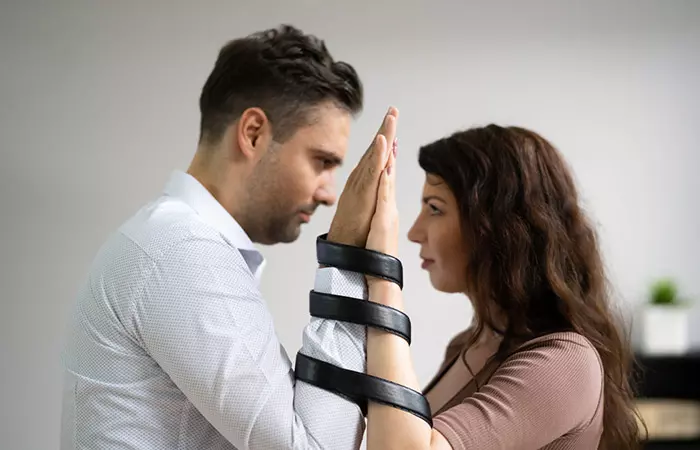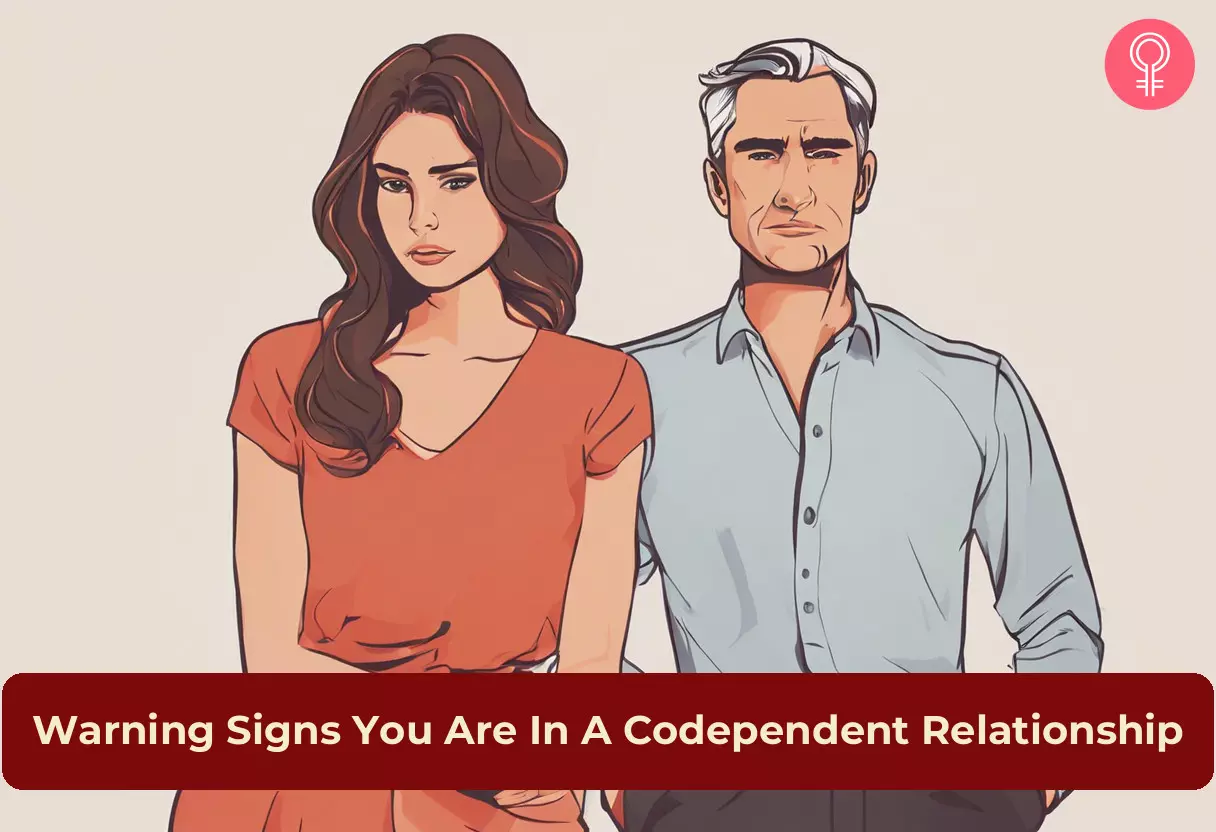21 Warning Signs You Are In A Codependent Relationship
Unfortunately, dependency and codependency are not the same in a relationship!
A codependent relationship is one where the partners do not have an equal balance of power, individual identities are entwined, and both members grow dependent on this kind of dynamic within the relationship. The primary symptom of codependency is a persistent preference for the needs of others above your own. Controlling behaviors, self-sacrifice, and a dread of being rejected are other warning signals. These, however, are not the only ones.
Understanding what codependency is and identifying the signs of codependency in your behavior is a crucial first step toward developing healthy boundaries and respecting your own needs. Continue reading to learn more about codependency, discover the 21 telltale signs that you’re in a codependent relationship, and what to do about it.
In This Article
What Is Codependency?

Codependency refers to an individual being dependent on someone else, generally a partner, for their self-worth. Codependent people frequently have a strong desire to ‘fix’ or assist another person since they find it difficult to establish healthy and stable relationships.
They frequently fail to set healthy boundaries for themselves, find it difficult to say no, and prioritize the wants and needs of others over their own. They feel guilty and anxious if they take care of themselves or prioritize their needs over those of their partner.
A codependent person needs the affirmation and love of another person to feel valuable. They may experience low self-esteem and feelings of shame, which makes them more likely to find enjoyment in interactions with others than with their partners. These individuals may have an anxious attachment. One major red flag is feeling excessively needy in a relationship, where one person relies heavily on the other for emotional support and validation.
A research review found that patterns of codependent behavior often involve four main elements (1):
- Self-sacrifice
- A tendency to think of others
- A desire for control that could lead to conflict
- Inability to understand and articulate emotions
 Did You Know?
Did You Know?In the following section, let us understand the different types of codependency.
Key Takeaways
- Codependency is the state in which an individual believes they depend on another person, usually their partner, for their sense of worth.
- Several factors might cause someone to become codependent, including trauma, grief, and unhealthy parent-child relationships.
- In a dependent relationship, both partners rely on one another for love and support, but a codependent relationship is the exact opposite.
- Instead of putting off your needs, prioritize taking care of yourself to avoid being codependent.
Types Of Codependency
Codependent behavior can be broadly classified into the following five types.
1. Passive Codependency
A codependent partner bottles up their resentments and anguish, overlooking their own well-being and peace to cater to all the unreasonable needs of their narcissistic partners.
2. Active Codependency
The codependent partner protests against their partner’s unfair and manipulative behaviors, arguing and demanding mutual respect and love, only to come up empty.
3. Cerebral Codependency
The codependent partner participates in educational or transformative activities to overcome relationship trauma by themselves without actually giving up on the toxic relationship.
4. Oblivious Codependency
The codependent partner detaches themselves or turns a blind eye to their situation and relationship problems, pretending to be leading a happy life.
5. Anorexic Codependency
The codependent partner holds themselves back from indulging in regular relationship activities and sexual intimacy, believing this abstinence can protect them from narcissistic abuse.
Now, knowing what codependency is, you must be wondering what factors lead to codependent relationships. Learn more in the following section.
What Causes Codependent Relationships?

Numerous factors can lead to someone becoming codependent. These consist of the following:
- Belonging to a dysfunctional family with conflict, misbehavior, addiction, and abuse.
- Experiencing a damaging parent-child relationship can teach a child to repress their own needs and feelings to please the parent, for example, if the parent is emotionally abusive.
- Having a family member with a physical or mental condition.
- Growing up in a home where one or both parents were addicts.
- Having a narcissistic parent.
- Being exposed to trauma or loss at a young age.
- Being involved in a friendship or work relationship where one person is perceived superior due to their skills or talent and hence everything is done as per their wish, while the other believes this unfair give and take to be well-deserved.
If you still cannot relate to them, scroll down to see the 21 signs that might tell you whether you’re in a codependent relationship rather than a healthy one!
21 Signs Of A Codependent Relationship
1. You Give Up Your Happiness For Your Partner’s Happiness
There are many ways that you can give up your happiness for someone else’s. Examples include constantly caving into the other person’s wishes, letting them make all the decisions, and putting their demands ahead of your own. Saying no can be difficult for you since you’re worried about disappointing or upsetting them. You may be in a codependent relationship if you feel extremely anxious while expressing your thoughts or disagreeing with your partner.
2. You Consider Your Life To Be Insufficiently Independent
One indicator of a codependent relationship is when you stop feeling like you have a life of your own. You don’t get time for yourself because you give all to your partner.
3. You Continue Your Relationship Despite Your Partner’s Past Wrongdoing
Codependency is demonstrated by allowing your partner to repeatedly let you down or harm you. It results from a lack of self-respect and limits in the partnership. You subconsciously think you deserve to be treated the way you are. Codependent or enabling partners frequently justify these actions by believing they can change their spouse in the future.
4. You Experience Difficulty Communicating Your Needs
Your partner is always able to express their wants to you and get them fulfilled, but you are unable to do the same. If you do, your demands will either be disregarded or devalued.
5. You Seek Your Partner’s Approval All The Time
The most significant factor to you is what he thinks of you. Of course, everybody values their partner’s opinion of them, but codependent people take that to a whole new level. To suit their tastes, you might even go so far as to buy stuff that only they would approve of.
6. You Feel Responsible For Their Deeds
When talking to friends or family, you may find yourself offering justifications and feeling guilty or ashamed about your partner’s behavior. This is another indication of codependency.
7 You Are Incredibly Loyal
In most relationships, loyalty is a positive quality, but it becomes problematic when it goes too far.
You stick by your partner’s side despite knowing the relationship is dysfunctional, and you are not being treated respectfully.
Putting up with emotional abuse and other harmful behavior without raising an objection is a severe sign of codependency.
8. You Are Afraid Of Rejection
Codependent persons highly value how others see them, especially their significant others.
You feel more validated when more people verbally compliment you, especially your partner. However, you begin to doubt yourself and your choices when criticized or rejected by your partner.
Jubilee, a blogger, shared her personal experience of being in a codependent relationship with her partner in her blog. She wrote, “Looking back, I realize that codependency was deeply rooted in my need for validation and my fear of abandonment. Throughout the relationship, I constantly sought external approval, believing that my self-worth hinged upon the acceptance and love of my partner (i).”
9. You Text Your Partner Every Hour

Some couples text each other throughout the day to keep each other in the loop with their respective schedules. However, you might be codependent if you’re bombarding your partner with texts and get anxious when they don’t respond immediately.
In this case, you are searching for that tiny bit of confirmation that they still require and desire you. However, if you are the ‘passive’ one, you might feel anxious and restless, and if you are the ‘controlling’ one, you might become angry at your partner for not answering immediately.
10. You Give, And Your Partner Takes
You continually give in to your spouse in the relationship, which isn’t necessarily bad. But don’t go overboard. However, it might be the other way around and you might be taking more from your partner, expecting more than giving.
Codependency is characterized by a partner receiving more from the relationship than they are giving.
11. Terms And Conditions Constrain Your Relationship
While the concept of love and affection binds relationships, codependent relationships are firmly constrained by rules and regulations because you feel compelled to maintain a positive relationship with your partner, but find yourself living on their terms.
12. You Believe You Are A Dedicated And Ideal Partner
Many codependent partners frequently believe their actions are positive. They believe that by committing to their partner, they are a dedicated and ideal partner because they will do anything to make them happy.
They are unaware of how destructive and harmful it may be to live your entire life for someone else while ignoring your own needs.
13. You Dislike When They Go Out Without You
You may be codependent if you can’t trust your partner and won’t let them leave the house without you. It is critical to provide people the flexibility to live their lives in a relationship and spend time with their friends and families, which you fail to consider.
14. You Usually Date Those Who Need Help
Do you frequently find yourself caring for others in relationships? And are you drawn to those that need help? These are warning signals of codependency. Codependent people are frequently drawn to those who struggle with addictions like drinking or gambling. You might endanger your safety in order to assist them, such as by spending money from your savings.
15. You Feel Entitled To The Others Time
There is a significant power imbalance in a codependent relationship. Frequently, you may be devoting significantly more time, attention, and concentration to your partner, or you can also demand that your partner spend most of their time with you alone.
16. You Feel Stuck In Your Relationship
You feel trapped in the relationship but might be in denial because once you recognize this, you will try to come out or just suffer. You might feel as though you are settling down with perhaps the incorrect partner in the relationship, but you rarely do anything about it.
17. You Use Sex To Attract Attention
We frequently mix up love with sexual attention. Though what you really desire is to be loved. You utilize sex to gain love and closeness instead because you need the validation that they still desire you physically.
18. It’s Difficult To Pin Down Exactly How You Feel
Is it difficult to distinguish between positive and negative aspects of your relationship when asked how things are going? Do you feel conflicted about, well, everything?
You are not giving enough time to analyze your feelings and emotions because you are so preoccupied with the other person in your relationship. As a result, you may be avoiding your concerns or feelings and replacing them with the euphoria that comes from just gratifying your partner..
19. You Feel Anxious Around Your Partner
When you are around other people, you feel more at ease. On the other hand, you feel like you are walking on eggshells around your partner because you are afraid they will be offended by your actions or words.
20. You Don’t Trust Yourself

If you have difficulty trusting yourself and feel governed by the opinions of others, you may have codependency in your relationships.
21. You Struggle With Your Sense of Self
In codependent relationships, individuals often lose sight of their own identity outside the partnership. You may find it difficult to define who you are without your partner, leading to confusion and a lack of direction in your personal life. This can cause you to feel incomplete or unsure about your purpose when you are not with them.
The first step in determining codependency in your relationships is recognizing the distinction between codependent and dependent relationships. Keep scrolling down to know the difference!
Codependent Vs. Dependent Relationship
Dependent Relationships
A dependent relationship is a healthy relationship. Here, two people rely on one another for love and support.
In a dependent relationship, both parties put their partner’s needs ahead of their hobbies and social life when required. However, they don’t suppress their needs or wants and enjoy going out with pals separately.
Both parties in a dependent relationship are able to communicate their needs and wants and deal with disputes in a constructive manner. There is also trust, so neither party is suspicious or actively attempting to dominate the other’s life.
For example, a couple may give each other pep talks if one feels down.
Remember that in a healthy relationship, the give and take are equal. Both partners must provide what the other needs.
Codependent Relationships
In a codependent relationship, the codependent partner lacks an identity outside the relationship.
In a codependent relationship, needs and desires are not addressed, and the codependent partner does not prioritize their needs and wishes. Instead, they are busy sacrificing themselves to suit their partner’s wants, but their partner shows little sign of returning the favor.
One or both people in a codependent relationship can be codependent, affecting their personal and professional connections and duties.
Codependent people are not honest with themselves or the people they are in relationships with.
For example, only the wife prepares and feeds the husband because she wants him to feel dependent on her.
Some people can overcome codependency on their own. On the other hand, some people may be motivated to alter their behavior just by learning what codependency is and the harm it can inflict.
Keep reading to know how codependent and interdependent relationships are different
Codependent Vs. Interdependent Relationship
In Codependent Relationships
- Boundaries: Poor or non-existent boundaries, leading to unhealthy enmeshment between partners.
- Self-Identity and Autonomy: One’s self-worth and identity become dependent on the partner’s approval or needs, leading to a loss of personal identity.
- Reciprocity: Involves excessive caretaking and sacrificing oneself for the other, creating an imbalance.
- Balance of Power and Control: Attempts to control or manipulate the partner’s behaviors and feelings, leading to an imbalance of power.
In the Interdependent Relationships
- Boundaries: Clear and healthy boundaries that preserve individual identity and autonomy.
- Self-Identity and Autonomy: Both partners maintain a strong, separate sense of self, fostering independence while staying connected.
- Reciprocity: Mutual, balanced support where both partners give and receive without neglecting themselves.
- Balance of Power and Control: Respect for each partner’s autonomy, allowing for equal support without coercion or dominance.
How To Not Be Codependent In A Relationship

- Prioritize communication and take care of yourself instead of ignoring your needs.
- Let others make their own decisions rather than you constantly trying to help or repair them.
- Value yourself rather than look to others for approval.
- Practice self-compassion instead of critiquing and judging yourself.
- Build a greater sense of self than trying to please others.
- Ask for assistance instead of being a martyr.
- Set boundaries and be firm instead of allowing individuals to abuse your goodwill.
 Quick Tip
Quick TipInfographic: 10 Clear Signs Of A Codependent Relationship
Each individual has their own strengths and limitations in relationships, which is normal. When you find the ideal partner, you will complement each other and grow as a person. However, there is a difference between feeling good about your partner’s approval and wholly depending on them for validation. It might be unhealthy and harmful for the two of you if that occurs. Check out the infographic below to learn the top 10 warning signs of a codependent relationship before it’s too late.

Illustration: StyleCraze Design Team
To Sum Up
It is common to fall in love and support the person you love. However, it is also vital to understand your limitations. You should understand the difference between being a cooperative partner and a codependent partner. By acknowledging the different signs of a codependent relationship, you will know if you are already in one. It will be a challenging and prolonged journey. Do not be hesitant to seek assistance in recovery. Keep in mind that there is still hope and that codependency is something you can overcome.
Frequently Asked Questions
Do codependents have empathy?
No. Empathy is the ability to put yourself in someone else’s shoes in order to understand and care for them. Codependency, however, is a compulsive behavior of entwining individuals and attempting to address their issues.
Why do codependents overthink?
Codependent people overthink because they overanalyze situations or mentally replay events. This is due to their dependence on relationships. Fear and anxiety are frequently the root causes of the obsession.
Is a codependent person controlling?
A codependent person frequently believes they have control over the thoughts and feelings of others despite having little real power over their own. As a result, they will try everything within their power to take control of the situation because they frequently believe their partner can’t address their problems independently without their assistance.
Illustration: Warning Signs You Are In A Codependent Relationship

Image: Stable Diffusion/StyleCraze Design Team
Personal Experience: Source
StyleCraze's articles are interwoven with authentic personal narratives that provide depth and resonance to our content. Below are the sources of the personal accounts referenced in this article.
i. Navigating the Aftermath of Codependent Relationships: The Torment, The Cycles, and The Emptiness I Never Wanted.https://medium.com/@jubilescense25/navigating-the-aftermath-of-codependent-relationships-the-torment-the-cycles-and-the-emptiness-b1ba6d0c3019
References
Articles on StyleCraze are backed by verified information from peer-reviewed and academic research papers, reputed organizations, research institutions, and medical associations to ensure accuracy and relevance. Read our editorial policy to learn more.
- The Lived Experience of Codependency: an Interpretative Phenomenological Analysis
https://link.springer.com/article/10.1007/s11469-018-9983-8
Read full bio of Hemali Adhiya
Read full bio of Sneha Tete
Read full bio of Asmita De
Read full bio of Sangita Goel


























Community Experiences
Join the conversation and become a part of our empowering community! Share your stories, experiences, and insights to connect with other beauty, lifestyle, and health enthusiasts.